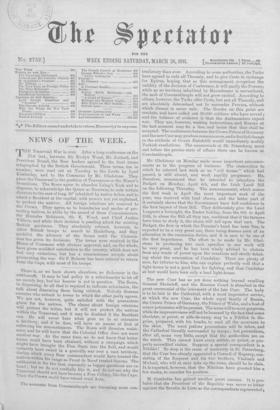There is, as we have shown elsewhere, no dishonour in
the .settlernetft. It may be bad policy in a schoolmaster to let off an unruly boy, but his honour is not in question. The Boers, in dispersing, do all that is required to indicate submission, the talk about disarming them being rubbish. Nobody disarms 'enemies who submit to terms to which the other party agrees. We are not, however, quite satisfied with the guarantees given for the natives. The clause about foreign relations -will protect the tribes, but it will not protect the natives within the Transvaal, and it may be doubted if the Resident can. He will never hear what goes on in so extensive It territory, and if he does, will have no means at first of .enforcing his remonstrances. The Boers will threaten resist- ance, and he will know that the Colonial Office does not want another war. At the same time, we do not know that better terms could have been obtained, without a campaign which might have brought the Free State into the field, and would certainly have ended in a guerrilla war over a vast territory, during which every Boer commandant would have treated the natives within his range as Front de Bumf treated Saxons. The settlement is for the best, especially as bigger questions are on hand ; but we do not cordially like it, and do not see why the Transvaal should not have become a Free Colony, like the Cape. 'Then the Crown could have vetoed cruel Acts.


































